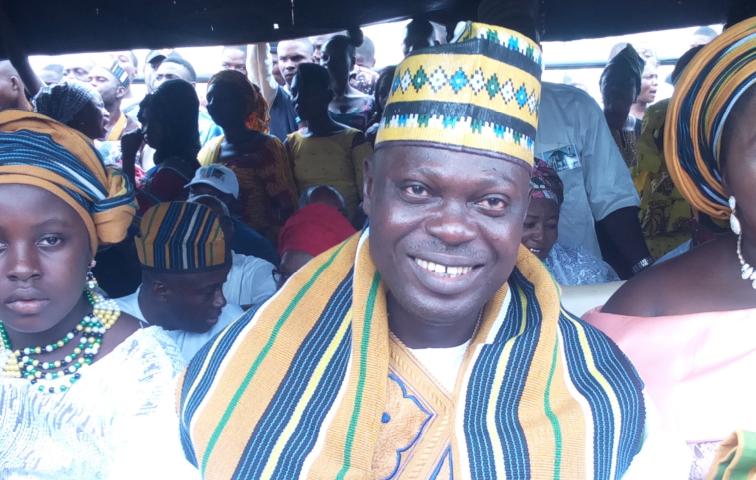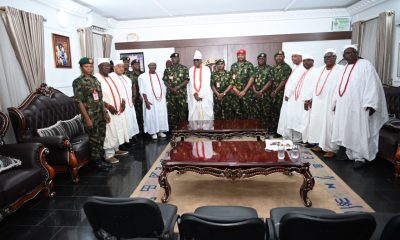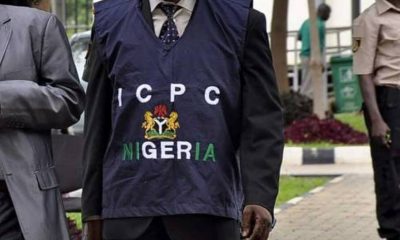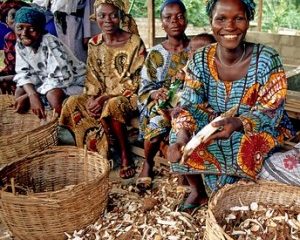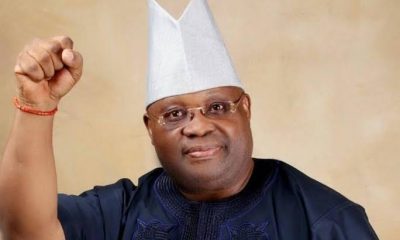NEWS
Igala Groan Over Neglect on Poverty-alleviation Schemes

From Joseph Amedu, Lokoja
The newly-elected National Leader of Uk’Omu Igala Organization, David Abutu, has cried out over the neglect of the Igala nation in the distribution of poverty-alleviation Programmes and COVID-19 palliatives.
The people of Kogi East Senatorial District who are mainly peasant farmers and hard-hit by the current economic downturn feel abandoned by the Buhari led APC administration since 2015 as they are not in the scheme of things at the State and national levels.
Director of Media and Publicity of the Uk’Omu Igala Organization, Theophilus Abbah quoted Abutu to have made the appeal in his brief interaction with the media after his election as National Leader of the socio-cultural organization.
The Uk’Omu Igala Organization is a non-political but umbrella organization for all social, political and developmental groups in Igala land and Kogi East in general.
Over the years, UIO had worked hand-in-hand with Kogi State Government and non-governmental organizations to execute social and humanitarian projects in Kogi East.
He therefore appealed to President Muhammadu Buhari to extend all such palliatives to the people of the district.
Abutu, in his appeal, said, “The Buhari administration has come up with many people-oriented and poverty alleviation programs. However, the people of Kogi East have not benefited from it very much. For instance, the Anchor Borrowers’ Scheme; COVID-19 palliatives, Trader-Moni, and other intervention schemes are not felt in Igala land.
The cashew industry is growing in Kogi East, but we need Federal Government’s support to strengthen the feeble hands of local farmers.
Kogi East is a peaceful part of Nigeria; we deserve the support of this government to lift our people out of poverty.”
On the part of the organization, the new National Leader promised to set in motion strategies and activities that would herald a new dawn in Igala land and Kogi State in general. Mr Abutu promised to mobilise members of UIO to raise funds to support small scale entrepreneurs and provide financial assistance to indigent students at various educational levels.
The election, for which delegates came from all over Nigeria to vote, was conducted last Saturday by an election committee under the chairmanship of Professor Sam Egwu, the Niger State Resident Electoral Commissioner of the Independent National Electoral Commission (INEC).
The following persons were elected into various positions: Mr David Abutu (National Leader); Dr Rakiya Abaji, Deputy National Leader; Dr Sabastine Abuh, National Secretary; Mrs Vivian Idama, National Treasurer; and Mr Suleiman Akpa, National Director (Mobilization).
Others elected into various positions, unopposed, include Mr Gabriel Edicha, Deputy National Secretary; Alhaji Musa K. Audu, National Financial Secretary; Mr Hussein Ahmed, National Auditor; Dr Theophilus Abbah, Media & Publicity Director; Mr Adams Ahmed, Deputy Director, Mobilization; Mr Mudi Yusuf, Director, Research & Development; and Ambassador Vera Otini Atodo, National Women Leader.
NEWS
Insecurity: CAN Tasks Government to Collaborate with Religious Organizations
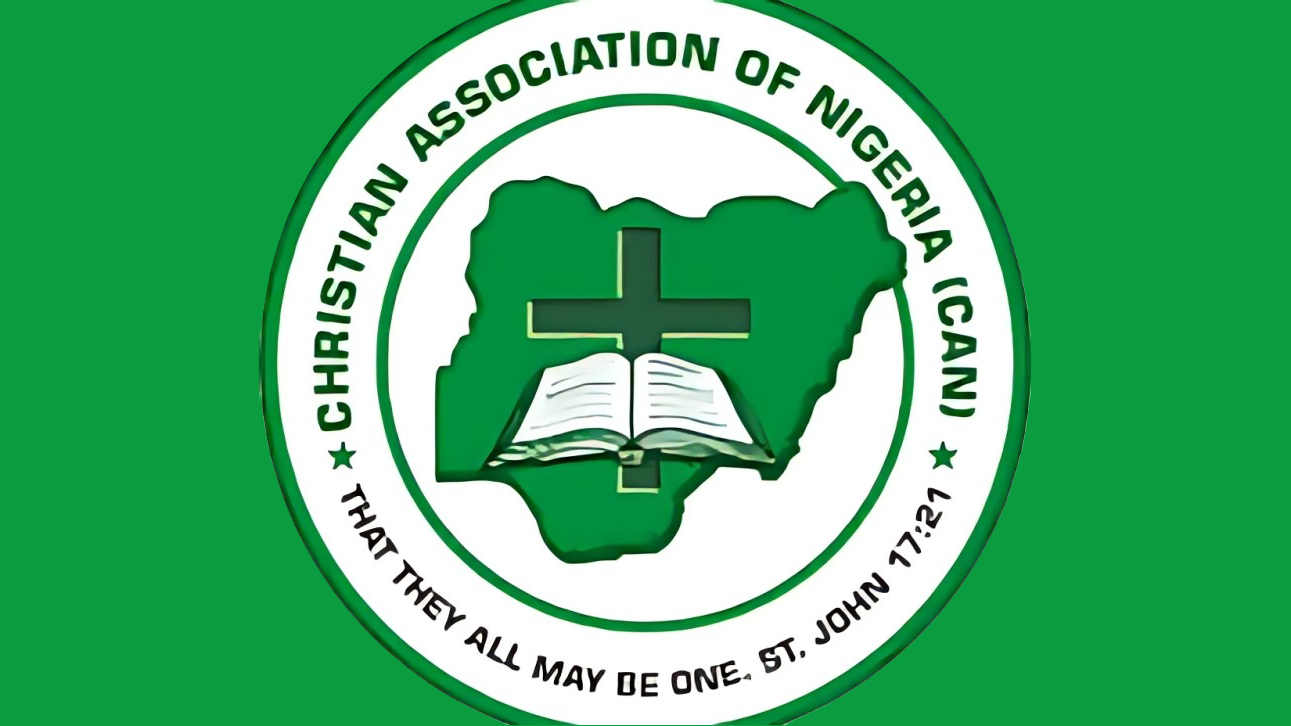
By Laide Akinboade, Abuja
The Christian Association of Nigeria (CAN) on Wednesday tasked the three tiers of Government in Nigeria to collaborate with religious organizations especially Nigeria Inter-Religious (NIREC) to resolve the nation’s insecurity challenges which will bring greater impact.
President CAN, Archbishop Daniel Okoh stated this in his goodwill message at the NIREC meeting in Abuja.
Okoh added that the collaboration with such groups would enhance public trust and ensure that peacebuilding strategies are people-centred and inclusive.
The CAN President, lamented apart from human tragedy, insecurity is crippling the economy, farmers are unable to access their farmlands, traders face rising operational challenges,and investors are discouraged by uncertainty.
He said these challenges have continued to deepen poverty, hunger, and frustration-conditions that further fuel instability.
According to Okoh, “Faith-based organisations therefore hold immense potential for strengthening security and sustaining peace. Because of their deep community roots, moral authority, and trusted presence, they are natural bridges to the hearts and minds of citizens.
“We, therefore, encourage governments at all levels to draw even closer to these organisations, including NIREC, by recognising the unique value they offer in mobilising communities, promoting dialogue, and nurturing social harmony.
“Working hand-in-hand – sharing insights, coordinating initiatives, and jointly seeking solutions – will produce far greater impact. Such partnership enhances public trust and ensures that peacebuilding strategies are people-centred and inclusive.
“Beyond human tragedy, insecurity is crippling our economy. Farmers are unable to access their farmlands, traders face rising operational challenges,and investors are discouraged by uncertainty. These realities continue to deepen poverty, hunger, and frustration-conditions that further fuel instability”.
The CAN Boss commended the government’s efforts, “While government bears the constitutional responsibility to protect lives and property, religious leaders carry a sacred moral responsibility to build mutual trust and foster religious harmony within communities.
“At this juncture, I would like to acknowledge the ongoing efforts of the Federal Government under the leadership of His Excellency, President Bola Tinubu, to reduce the level of insecurity in our nation. We acknowledge the renewed initiatives to strengthen security architecture in order to combat the activities of terrorists and bandits across the country and we encourage His Excellency to do more”.
He said, “This meeting comes at a most critical moment in our national history. Nigeria continues to grapple with insecurity that threatens our collective survival and national cohesion. Banditry, kidnapping for ransom, violent extremism, and other forms of criminality have spread across the country-leaving behind sorrow, fear, and displacement.
“Excellencies, Eminent Religious leaders, brothers and sisters, Faith institutions remain among the most trusted and far-reaching structures in Nigeria. Our pulpits, mosques, and community networks shape values, guide behaviour, and can either calm tensions or escalate distrust”.
He noted that NIREC remains a strong asset, “NIREC remains a strategic national asset. It enables us to speak with one voice against violence, condemn criminality in all its forms – irrespective of the victims’ identity – and affirm that no religion justifies the taking of innocent lives. This, I trust, we shall continue to uphold with all sincerity.
“Together, we can transform hope into collective action – and build a safer, more stable, and more united Nigeria”.
He therefore reiterated the commitment of CAN in supporting NIREC and collaborating with the government in restoring peace and security nationwide.
He stressed, “However, peace cannot be sustained without justice. Perpetrators of violence – and those who finance them or encourage them – must be held accountable; victims must be supported and rehabilitated; and communities must be reassured that the rule of law protects every citizen equally.
“As religious leaders, we must intensify prayers alongside action. We must continue to use our influence to encourage citizens to reject violence, resist misinformation, cooperate with lawful authorities, and uphold the enduring values of honesty, compassion, and national unity. Our unity across faith lines is, in itself, a message of hope to a nation weary of fear and division”.
| ReplyReply allForwardAdd reaction |
NEWS
SEC Asks Investment Tribunal to Freeze CBEX Bank Accounts

By Tony Obiechina, Abuja
The Securities and Exchange Commission (SEC) Nigeria has filed a suit before the Investment and Securities Tribunal (IST) seeking the freezing of bank accounts belonging to CBEX and other defendants with commercial banks or other financial institutions in Nigeria.
In the case of IST/OA/02/2025 Securities and Exchange Commission & Anor v Crypto Bridge Exchange (CBEX) and 25 others, which is the first for the 6th Tribunal presided by Hon.
Aminu Jinaidu the Honourable Chairman, Investments and Securities Tribunal (IST), the commission also urged the Tribunal to seize the houses and other assets of the defendants acquired from the proceeds of the monies invested by the general public in the CBEX scheme acting as digital assets, platforms/capital market operators.SEC in its plea maintained that CBEX was an unregistered platform promising its users 100 percent return on investments within 30 days which is unlawful and contrary to section 3 (b) of the Investments and Securities Act 2025.
The Commission further revealed that the Securities and Futures Commission of Hong Kong had on April 23rd 2024 issued an advisory note against CBEX stating that it is a suspicious virtual asset company and adopted a name that was similar to that of a property rights trading organization based in China when in fact they are not associated in any way.
However the Tribunal ordered that hearing notice be served on CBEX via National Newspapers because CBEX who are the defendants in the case did not appear nor were they represented in court.
CBEX earlier launched in Nigeria around July 2024, operating through a website and mobile app. It claimed to use advanced Artificial Intelligence (AI) to generate significant profits from crypto trading, promising returns of up to 100% within a 40- to 45-day lock-in period.
CBEX (also known as Crypto Bridge Exchange), was exposed as a Ponzi scheme, leading to an estimated loss of over N1.3 trillion (approximately $800 million) for investors.
The Chairman of the IST also presided over the following cases: Benue Investments Property co. Ltd & Anor v Securities and Exchange Commission & 6 others, Maven Asset Management Ltd v Securities and Exchange Commission, John Makinde Onade & Anor v First Registrars & Investors Services Ltd & Anor and Securities and Exchange Commission and Anor v Tourist Company of Nigeria PLC and 6 Ors
The cases were adjourned to January 27, 2026.
NEWS
Security Operatives Arrest 32-yr-old Man for Allegedly Negotiating Ammunition for Bandits in Zamfara

From Ifeanyichukwu Nwannah, Gusau
A 32-year-old man, Ahmed Abubakar suspected to be armed weapons dealer has been arrested in Abuba, for allegedly suppling ammunitions to bandits in Zamfara State.
This medium gathered that, a security and counter insurgency expert on his verified X account on Tuesday, 9th December 2025, arrested the 32-year-old man by the operatives of the Mabushi Division following credible intelligence.
The suspect said to be currently residing at Anguwan Dodo, Gwagwalada, has allegedly contacted a serving soldier, Corporal Yusuf Mohammed, to help him source 1,000 rounds of ammunition, purportedly for bandit groups in Zamfara State, which they agreed on certain amount for a cash reward.
“Sources said the suspect, had allegedly contacted a Nigerian Army personnel, Cpl Yusuf Mohammed, to help him procure 1,000 rounds of ammunition, which he claimed were meant for bandits in Zamfara for a monetary reward”
This medium also learnt that Abubakar reportedly confessed during interrogation that he was acting on the instructions of his uncle, one Ahmed Yakubu, who lives at the same address, but is currently on the run.
He said that Yakubu had instructed him to buy the ammunition and transport the arms to Zamfara State for use by bandits in their area.
This medium also learnt that the police recovered N170, 100 from the suspect, believed to be part of the funds intended for the illegal purchase.
The Command said, “the suspect is currently in custody undergoing further investigation, while efforts are ongoing to track down his fleeing accomplice,” he added.
The FCT Police Command spokesperson, Josephine Adeh, could not be reached for comments, as calls to her telephone lines were not reachable, a text message sent to her was yet to be replied as of the time of filing this report.
The development came amid recurring attacks and kidnappings carried out by bandits in the area.
Recall that a few days ago, the command busted a kidnapping syndicate following a raid on their den in Ushafa, which led to the rescue of seven kidnapped victims after a gun duel.
The police spokesperson for the FCT Command, SP Josephine Adeh, disclosed this in a statement.
According to her, “on December 5, 2025, the FCT Police Command received a distress report that armed men had invaded a community in Ushafa and abducted several residents.
“In a swift response, a Joint Team comprising operatives of the FCT Anti-Kidnapping Unit, alongside personnel of the Army and the DSS, mobilised to the area on 6th December 2025 and immediately commenced a coordinated search operation.
“Acting on credible intelligence, the team traced the suspects through the outskirts of Mpape community into settlements extending towards Kagarko LGA of Kaduna State.
“Upon sighting the security operatives, the kidnappers opened fire, engaging the team in a fierce gun duel.
“The operatives returned fire with superior force, successfully dislodging the criminals from their hideout and rescuing one victim who was found in their custody.”
| ReplyReply allForwardAdd reaction |










